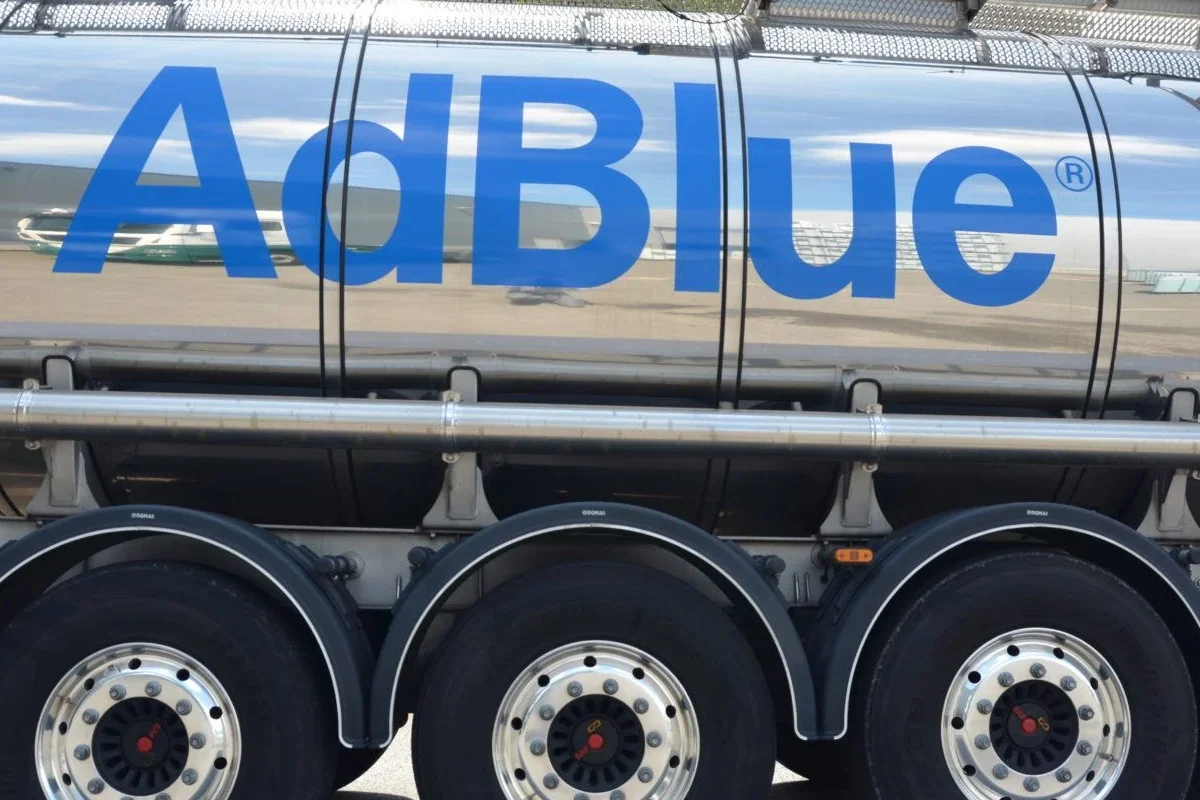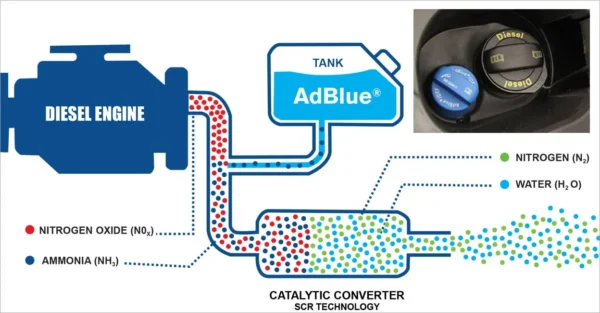
Table of Contents
If you own a diesel-powered vehicle, especially a truck, you’ve likely heard of AdBlue. It’s a crucial component in modern diesel engines, playing a pivotal role in reducing harmful emissions and ensuring your vehicle complies with environmental regulations.
In this comprehensive guide, we’ll delve into what AdBlue is, who requires it in South Africa, what it does in trucks, its availability in the country, how long it lasts, its composition, colour, dos and don’ts of using it, and its impact on fuel efficiency.
We’ll also discuss the Euro emission standards in South Africa, the latest trucks’ compliance with these standards, and how the choice of Euro version can impact efficiency on national routes.
What is AdBlue?
AdBlue, also known as Diesel Exhaust Fluid (DEF), is a clear, non-toxic, and odourless solution primarily composed of purified water and automotive-grade urea. It is used in modern diesel engines equipped with Selective Catalytic Reduction (SCR) technology to reduce harmful emissions, particularly nitrogen oxides (NOx). AdBlue is injected into the exhaust system, where it reacts with NOx to convert it into harmless nitrogen and water vapour, thus significantly reducing emissions.
Who Requires AdBlue in South Africa?
AdBlue is primarily required in diesel-powered vehicles, including trucks, buses, and certain passenger cars, fitted with SCR technology. In South Africa, it is essential for vehicles to meet stringent emission standards set by the National Environmental Management: Air Quality Act (NEM: AQA) and other regulatory bodies. South Africa has adopted the Euro emission standards, which are similar to those in Europe, to control air pollution and protect the environment. These standards dictate the maximum permissible levels of various pollutants in vehicle emissions.
Bridging the Emission Gap: Euro Standards in South Africa
South Africa has historically lagged behind European countries in adopting and enforcing stringent emission standards. However, in recent years, the country has made significant strides to align its regulations with international norms. The Euro emission standards, which originated in Europe to reduce vehicle emissions, serve as a global benchmark. South Africa’s adoption of these standards signifies a commitment to curbing pollution and addressing environmental concerns.
Here is an overview of the Euro emission standards of CO = Carbon Monoxide, NOx = Oxides of Nitrogen, HC = Hydrocarbons and PM = Particulate matter. South Africa still lags behind on Euro 2 with Euro 3-4 not being compulsory:
- Euro 1 (1992): The first Euro standard aimed to reduce carbon monoxide (CO) and hydrocarbon (HC) emissions from gasoline-powered vehicles and smoke emissions from diesel vehicles.
- Euro 2 (1996): Building upon Euro 1, Euro 2 further reduced CO and HC emissions from gasoline vehicles and introduced limits for nitrogen oxide (NOx) emissions. For diesel vehicles, it lowered smoke emissions.
- Euro 3 (2000): Euro 3 continued to reduce CO, HC, and NOx emissions in gasoline vehicles. For diesel vehicles, it set stricter limits for NOx and introduced particulate matter (PM) limits.
- Euro 4 (2005): Euro 4 lowered CO, HC, and NOx emissions for gasoline vehicles and significantly reduced NOx and PM emissions for diesel vehicles.
- Euro 5 (2009): Euro 5 introduced even stricter emission limits for CO, HC, NOx, and PM for both gasoline and diesel vehicles. It also mandated the use of diesel particulate filters (DPF) for diesel vehicles.
- Euro 6 (2014): The most recent standard, Euro 6, imposed very low limits for CO, HC, NOx, and PM emissions for gasoline and diesel vehicles. It also mandated the use of advanced emission control technologies such as selective catalytic reduction (SCR) and diesel particulate filters for diesel vehicles to meet these stringent standards.
The Latest Trucks and Euro Compliance
The latest trucks in South Africa are often Euro 3 compliant. The choice of the Euro version can significantly impact efficiency on national routes. For instance, the Mercedes-Benz Actros 2652LS/33 RE, which is Euro 3 compliant, proved to be the most productive truck in South Africa in the 2022 Truck Test. Euro 3 compliance in trucks ensures reduced emissions, better fuel efficiency, and compliance with South Africa’s emission standards.
What Does AdBlue Do in Trucks?
In trucks, AdBlue plays a pivotal role in reducing harmful emissions, making them more environmentally friendly. When introduced into the exhaust system, AdBlue chemically reacts with NOx emissions, breaking them down into nitrogen and water vapour. This process helps trucks in South Africa meet Euro 3 and other strict emission standards, significantly reducing the environmental impact of diesel engines.

Is AdBlue Available in South Africa?
Yes, AdBlue is readily available in South Africa. You can find it at some truck stops, service stations, and automotive supply stores across the country. The widespread availability ensures that truck drivers in South Africa can easily access AdBlue to keep their vehicles compliant with emissions regulations.
How Long Does AdBlue Last in South Africa?
The consumption rate of AdBlue in South Africa varies depending on factors like the engine’s size, load, and operating conditions. On average, a truck can cover approximately 1,000 to 2,000 kilometres per 10 litres of AdBlue. It’s essential to monitor AdBlue levels and refill the tank when necessary to avoid running out, especially during long journeys.
What Does AdBlue Consist Of?
AdBlue primarily consists of two components:
- Purified Water: This makes up about 67.5% of AdBlue and acts as the medium for the chemical reaction with NOx emissions.
- Automotive-Grade Urea: Comprising around 32.5% of AdBlue, urea is a high-purity chemical that facilitates the conversion of NOx emissions into harmless compounds.
The quality of AdBlue is crucial in South Africa to prevent engine damage, so always ensure you use a certified AdBlue product.
Is AdBlue Blue in Colour?
Despite the name “AdBlue,” the solution itself does not have a blue colour; the name is derived from the German word “Ad” for additive and the idea of making emissions cleaner.
The Dos and Don’ts of Using AdBlue in South Africa
Dos:
- Use Certified AdBlue: Always use AdBlue from reputable suppliers in South Africa to ensure its purity and quality.
- Store AdBlue Properly: Keep it in a cool, dry place and protect it from contamination.
- Follow Manufacturer Guidelines: Adhere to your vehicle manufacturer’s recommendations for AdBlue usage, including refilling intervals.
- Monitor AdBlue Levels: Regularly check the AdBlue tank to avoid running out during journeys.
- Handle with Care: Use dedicated equipment for AdBlue in South Africa to prevent contamination and spills.
Don’ts:
- Mix with Other Fluids: Never mix AdBlue with any other substances as it can compromise its quality and effectiveness.
- Allow Contamination: Avoid contaminating AdBlue with dust, dirt, or other substances during handling and refilling.
- Use Non-Approved Containers: Use only containers and equipment designed for AdBlue in South Africa to prevent contamination.
Will My Vehicle Stop Working if I Run Out of AdBlue?
If your vehicle’s AdBlue tank runs empty in South Africa, it will not stop working immediately. However, the engine’s power will be gradually reduced, and eventually, it may limit your vehicle’s speed to ensure compliance with emissions regulations. It’s essential to refill the AdBlue tank as soon as the warning light indicates low levels to avoid inconvenience during your journey.
Does AdBlue Increase Fuel Efficiency?
While AdBlue itself does not directly increase fuel efficiency in South Africa, it indirectly contributes to better fuel economy by helping the engine operate more efficiently.
By reducing NOx emissions, which can negatively impact engine performance, AdBlue helps maintain optimal engine conditions. This, in turn, can lead to improved fuel efficiency and reduced maintenance costs over time.
AdBlue is a vital component in modern diesel engines, especially for trucks in South Africa, as it plays a significant role in reducing harmful emissions and ensuring compliance with strict environmental regulations.
As South Africa embraces Euro 3 and other Euro emission standards and adopts technologies like AdBlue, it signifies the country’s commitment to curbing pollution and protecting the environment.
Proper handling and usage of AdBlue are crucial for maintaining vehicle performance, bridging the emission gap, and minimizing its environmental impact.
So, if you own a diesel-powered vehicle in South Africa, ensure you understand AdBlue and its importance in keeping our air cleaner and our roads greener.





